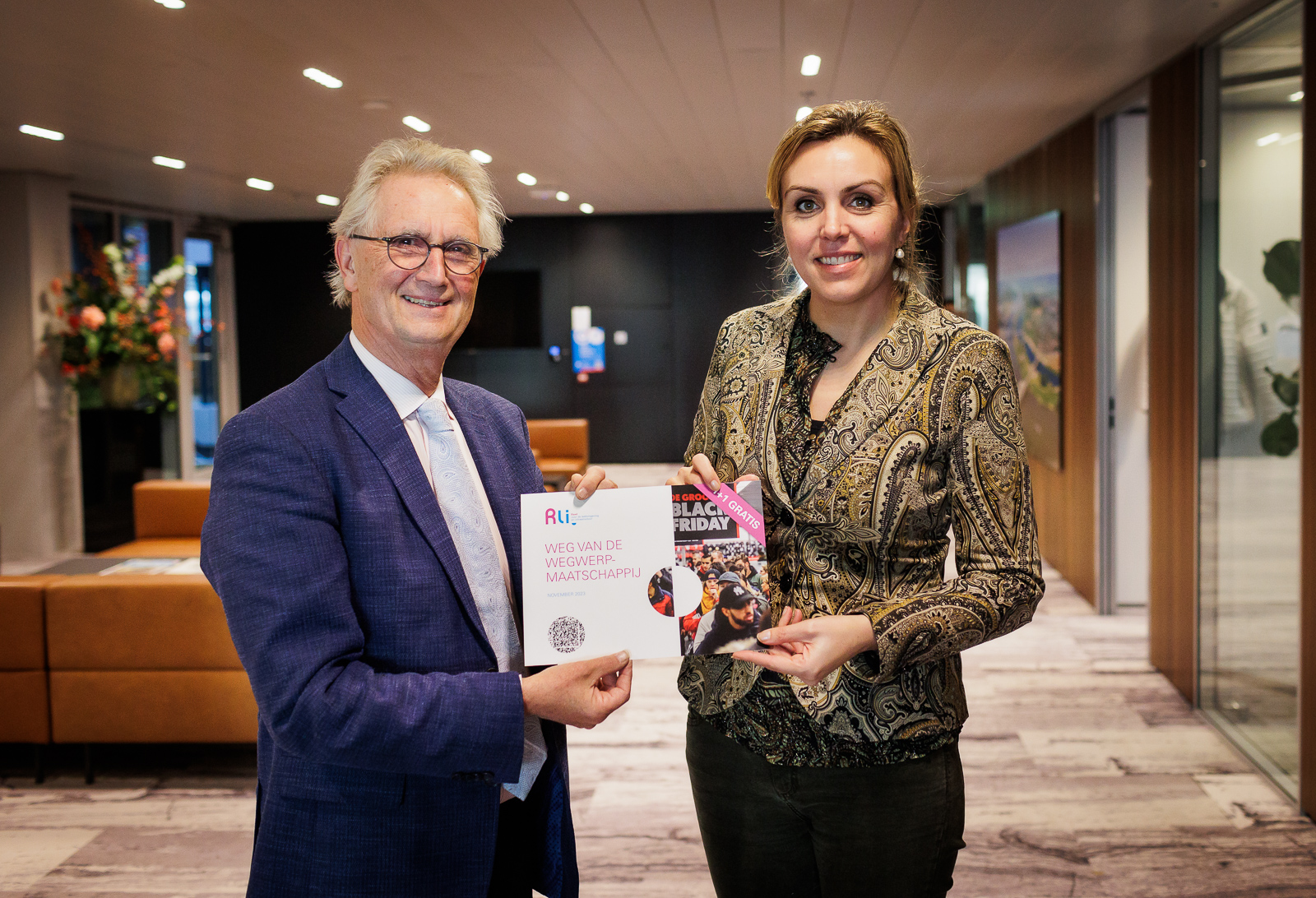Background and request for advice
Globally – thus including in the Netherlands – more and more stuff is being thrown away. This involves mainly cheap, non-sustainable goods produced in low-wage countries, and often discarded after only short-term use. This leads to all kinds of negative effects on the living environment: environmental pollution, CO2 emissions, declining biodiversity, depletion of natural resources, and exploitation of labour.
The advisory report focuses on three commodity flows: clothing, furniture, and consumer electronics. Due to its low price and quality, clothing – especially “fast fashion” – has become a disposable product in the eyes of many consumers. The same is true for home accessories, “fast furniture”, and consumer electronics. Production of these involves all kinds of cost cutting, resulting in products that don’t last very long. Consumers are also enticed – for instance by rock-bottom offers – to purchase throw-away products. All these factors encourage throw-away behaviour.
The main question addressed in this advisory report is “How can the Netherlands, both nationally and in a European context, ensure phasing out of the throw-away society, as part of the transition to the production and use of sustainable consumer goods? What interventions are needed to make this possible?”
Explanation
There is an increasing focus in Dutch government policy on making the economy more sustainable. There is very little focus, however, on countering the throw-away society, which constitutes a barrier to the necessary transition to a sustainable and circular economy. It is therefore important that policy should also be aimed at phasing it out. You can’t have one without the other.
The throw-away society is an inherent component of our current economic system. Companies strive to sell as many goods as possible for the lowest possible price, a revenue model that ultimately leads to an economic ‘race to the bottom’. Fast fashion, for example, is extremely focused on low costs and therefore also on low product quality. Much of the cheaply produced clothing soon starts to wear out and is quickly discarded. The same trend is apparent with furniture and electronics.
We identify four mechanisms that sustain the throw-away trend:
- The external costs of products (environmental impact, poor working conditions) are not factored into the price of the product.
- Producers' selection as regards materials and production methods means that products have an ever-shorter lifespan.
- Product design takes no account of what happens to the product, and the raw materials used in it, during the disposal phase.
- Many people find it difficult to make a responsible choice from the range of products available (including online) due to the lack of clear information about products and because they are exposed to temptation and deception.
The Rli offers five recommendations for reversing the throw-away trend. Our focus is on policy interventions for the next five years.
Enforce sustainable production processes, on the way to true product pricing
- At EU level, advocate ambitious content of the Ecodesign Regulation and the resulting product requirements, as well as the European Transparency (CSDDD and CSRD) Directives.
- Ensure ambitious content and implementation of the national legislation for International Responsible Business Conduct ('International RBC') (IMVO).
Strive for longer-lasting products by focusing on reuse and repair
- Promote a professional repair market by mandating that authorised repairers have access to spare parts from all electronics chains, and abolish the VAT on repairs.
- Make second-hand shops and second-hand goods more accessible and visible.
Strive for value retention through reuse, high-grade recycling, and improved EPR schemes
- Strive for improved, larger-scale collection, sorting, and recycling of discarded products, for example by means of an obligatory doorstep return system for large products (washing machines, mattresses) and a deposit scheme for batteries.
- Ensure greater control of the content and creation of extended producer responsibility (EPR) schemes. Set more stringent requirements for high-grade recycling and ensure that improved product design and reuse become worthwhile.
Assist consumers to make deliberate choices and protect them against manipulation
- Introduce a lifespan label and a repair label with information on the expected useful life and reparability of products.
- Combat greenwashing and ban or discourage rock-bottom pricing of products that mostly encourages impulsive purchases.
As government, take the lead, coordinate matters, and set a good example
- Make clear how consumers can contribute to sustainability themselves, and create the necessary conditions for them to do so.
- Support the business community in reducing harmful impacts of their products and production chains. Establish sectoral support centres.
- Ensure more robust cross-ministry coordination and control of policy aimed at phasing out the throw-away society. Free up substantially larger funding and capacity for that purpose.
The above recommendations focus on the next five years. In the medium term, however, more will be needed. The government will need to effectuate fundamental changes in order to bring about the transition to a sustainable economy that operates within the planetary boundaries.
Schedule
On 24 November 2023, Black Friday, the Council published its advisory report Phasing Out the Throw-Away Society, which it had presented to the State Secretary for Infrastructure and Water Management, Vivianne Heijnen, the day before. The report was also presented to the Minister of Economic Affairs and Climate Policy, Micky Adriaansens, and the Presidents of the Senate and House of Representatives.

State Secretary for Infrastructure and Water Management, Vivianne Heijnen, takes receipt of the advisory report Phasing Out the Throw-Away Society on 23 November 2023. Left to right: State Secretary Heijnen and André van der Zande (Rli Council Member and Chair of the committee) Photo: Fred Ernst
More information
For more information about the advisory report or to comment, please contact the project leader, Bas Waterhout, at bas.waterhout@rli.nl, or on +31 (0)6 21178802.